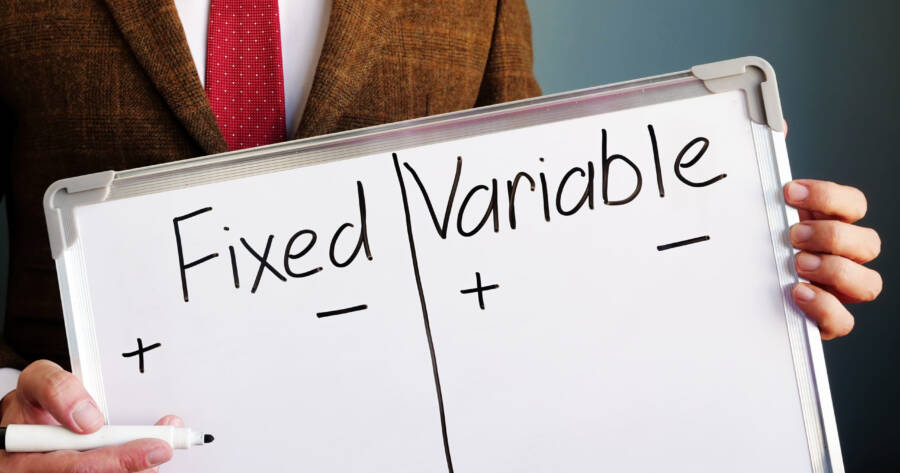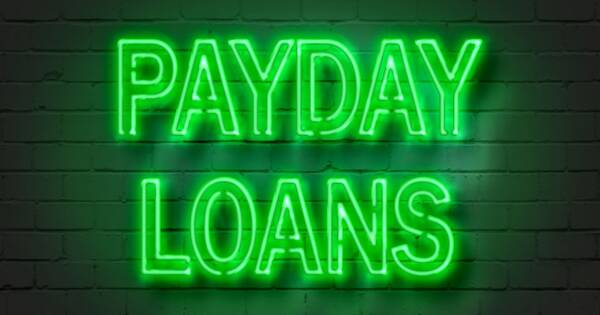If you’ve come across the terms “fixed rate” and “variable rate” before, you might have overlooked them as complicated financial terms. But really, when you break it down, fixed and variable rates are actually fairly simple. They are exactly what they sound like — an interest rate that is either set in one spot or one that varies, depending on some outside factors. Plenty of loans are offered in both formats, so you really do need to know the difference.
Types of Loans with Fixed and Variable Rates
Most of the fixed and variable rates you’ll come across are part of common loans you hear about every day. The fixed/variable rate describes the type of interest you’ll pay on that loan. For example, your home, auto, student, and personal loans can all have either a fixed or variable rate.
“Not only are home and business loans made at fixed and variable rates, credit cards also are issued with a fixed annual percentage rate or a variable annual percentage rate,” says Chron.com. The rate of interest you pay on any loan is fixed, variable. In some cases, it can even be a mix of both.
Fixed Rate Loans
We’ll tackle the fixed-rate loans first. They are loans that have a set interest rate for the length of the loan. It won’t change at all, no matter what happens to the overall economy. In many ways, choosing a fixed-rate loan is the more conservative approach of the two. However, that’s not to say it’s beneficial for everyone.
Here are some basic characteristics of a fixed-rate loan.
- Monthly payments, including interest, are set from the get-go and do not change. You will always know how much you owe and be able to plan for it in your monthly budget.
- Your interest rate is set at the time of the origination of the loan. It will not fluctuate. The interest rate you obtain may or may not be higher or lower than the market rate.
- Fixed interest rates typically “start out higher than variable rates.” You’ll be paying more for a secured interest rate versus an unsecured and potentially lower rate. However, you won’t have to worry about the interest rate spiking up and your loan payments becoming unaffordable.
As you can see, fixed interest rates are typically what we think of when it comes to loans. If you want to borrow a particular sum, it will take a certain amount of time to pay it off, with a set interest rate included in those payments.
Car commercials are perhaps the best example of fixed-rate loans. You’ve likely heard an ad for a particular model being sold for “1.9% APR over 72 months.” That’s the fixed loan terms, in a nutshell. You’ll pay the price of the car, plus 1.9% annual interest, in equal payments (usually monthly or bi-weekly) over the next six years. Nice and tidy, and easy to plan around.
Variable Rate Loans
On the other hand, variable rates are just that — interest rates that vary. Here’s a simple definition from Investopedia:
“ A variable interest rate loan is a loan in which the interest rate charged on the outstanding balance varies as market interest rates change.”
This benchmark is typically either the London Interbank Offered Rate (LIBOR) or the Prime Rate. Interest rates from either of these sources often changes monthly. Though it can get complicated, the important thing to remember is that the rate will fluctuate. However, there’s often a cap on how far that fluctuation can go. This fluctuation gives you opportunity — you can either pay less than a fixed interest rate loan, or more. It all depends on what the rates are at any given time. Some variable rates have the option to “lock-in” a rate, if you think the Prime Rate is going to rise.
Variable interest rates, just like fixed ones, are determined when you obtain the loan. However, they’re not secured from month-to-month. If you’re looking to mitigate the risk of a variable interest rate, shorter loan terms are better. Generally speaking, your interest rate won’t vary as much in six months as it could in a few years. This is why a lot of people renew their mortgages for one-year at a variable rate. It’s a safer short term gamble.
Fixed vs. Variable Rates: What to Consider
If you’re in the market for a loan, there are a few things you’ll want to account for as you gather information.
- Fixed rates are better for those who “believe interest rates will increase in the future.” As interest rates increase, so do payments on a variable rate loan.
- “The decisions on loan amount, term, and fixed or variable rate all depend upon your personal situation and flexibility,” says Sofi.com. Consider what you plan to do in the next few years and where you’re at financially before making a decision.
- Variable rates are typically lower than fixed rates. This makes it easier for folks with lower credit scores to obtain a loan.
- While it is possible to switch between fixed and variable interest rates, this change doesn’t come without its own associated costs, terms, and eligibility.
- With interest rates currently so low, it could be best for you to choose a fixed rate loan. Interest rates will likely not go any lower (as of January 2021). You can safely guess that your payments would increase with a variable rate loan.
- Though fixed rate loans typically have a higher interest rate, it’s possible to counteract this increase by putting more money down. This is typically a good move when buying a car or a house.
After thinking about what types of interest rates are best for you, it might still be unclear which path you should take. There are plenty of experts out there who can sit down with you and explain which move is best for your circumstances. We encourage you to reach out to financial professionals, especially with loans extending over 15 years (like a mortgage). The more research you can do to prepare yourself, the smarter decision you’ll be able to make
Interest Rates: The Cost of Credit
The long and short of this is that interest rates are inextricably tied to credit and loans. It pays — sometimes literally— to know which type of interest rate will improve your financial future. A fixed-rate loan might help you budget better in the short term. A variable-rate loan may save you money in the long term. Both are worthy considerations. There’s not necessarily a right or wrong answer, just one that’s a better fit for your particular situation.
Hopefully, you’ve come to understand what fixed and variable rates are, and how you can take advantage of their unique characteristics to achieve your financial goals. Just reading this article allows you to approach milestones in your life prepared, so you can focus on celebrating, rather than stressing.
Be confident in tackling financial topics, and as always, come back for more money tips and advice. There’s plenty more to learn!




